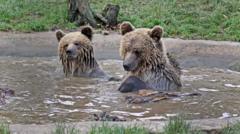Did a Seagull Just Ruin a Topless Brit’s Relaxation in Costa Del Sol?

Understanding the Cultural Significance of Bird Droppings: A Look at Luck and Beliefs
In many parts of the world, the unexpected and often unpleasant experience of having a bird relieve itself on you is steeped in a cultural belief that it brings good luck. This article delves into the origins of this intriguing superstition, the various cultural interpretations surrounding it, and the skepticism that accompanies such a belief. Through this exploration, we will examine not only the phenomenon of bird droppings as a supposed harbinger of fortune but also the practical implications of living alongside our feathered friends.
The Origins of the Belief in Good Luck
The belief that bird poop brings good luck can be traced back to various cultures across the globe. This superstition is particularly strong in European societies, where it is often considered a positive omen. The reasoning behind this belief is somewhat whimsical and often tied to the idea that bird droppings are a sign of abundance. After all, if a bird is dropping its waste on you, it suggests that the creature has been well-fed and is, in a way, sharing its fortune with you.
Symbolism in Different Cultures
Throughout history, birds have held symbolic significance in many cultures. Here are some examples of how different societies interpret bird droppings:
- European Cultures: In countries like Russia and Italy, it is commonly believed that if a bird poops on you, it is a sign of incoming wealth. This belief may have originated from the association of birds with prosperity and abundance.
- Asian Cultures: In some Asian cultures, bird droppings are seen as a blessing. For instance, in certain regions of India, it is thought that bird droppings signify good fortune in business and personal endeavors.
- Indigenous Tribes: Various indigenous tribes in North America regard birds as messengers of the spirits. Therefore, bird droppings may be interpreted as a sign that spiritual forces are favoring an individual.
The Skeptics’ Perspective
While the idea of bird poop being a symbol of good luck is charming, it has not escaped the scrutiny of skeptics. Many argue that this belief is simply a way to psychologically cope with an unpleasant experience. When something undesirable happens, humans often seek to reinterpret the event to find a silver lining. This tendency to reframe negative experiences into positive ones is a common psychological response.
Psychological Reframing
The concept of psychological reframing suggests that individuals can change their perception of an event to alter their emotional response. For instance, instead of feeling embarrassed or disgusted after being pooped on by a bird, some might choose to view it as an opportunity for good luck. This coping mechanism can be particularly useful in daily life, where one might face numerous challenges.
The Reality of Bird Droppings: A Practical Perspective
Beyond the superstitions, it’s essential to consider the practical implications of bird droppings. Particularly in urban areas, the presence of birds like seagulls can lead to various challenges, including health risks and property damage.
Health Risks Associated with Bird Droppings
Bird droppings can pose health risks to humans. They may carry diseases such as:
- Histoplasmosis: A fungal infection that can be contracted from inhaling spores found in bird droppings.
- Cryptococcosis: Another fungal disease that can affect the lungs and central nervous system, often associated with pigeon droppings.
- Psittacosis: A bacterial infection that can spread from birds to humans, typically through contact with droppings.
Given these health risks, it’s crucial for individuals living in areas with high bird populations to exercise caution and maintain cleanliness.
Environmental Impacts
Bird droppings can also cause environmental damage. In urban settings, excessive bird waste can lead to:
- Corrosion of Buildings: Bird droppings are acidic and can deteriorate structures over time.
- Pollution of Water Sources: Runoff from bird droppings can contaminate local water supplies.
As a result, some cities, such as Malaga, have implemented control programs to manage bird populations and mitigate these environmental impacts.
Birds as Pests: The Seagull Dilemma
Particularly in coastal regions, seagulls have become notorious for their scavenging habits. The yellow-legged seagull, prevalent along the Costa del Sol, is both a beloved and despised creature. Their behavior often leads to unwanted encounters, especially for tourists.
The Tourist Experience with Seagulls
For visitors, encountering seagulls can lead to amusing yet frustrating experiences. A recent TikTok video shared by a couple enjoying a beach day highlights this dichotomy. Amy humorously narrated her husband’s unfortunate encounter with a seagull, saying, “When you are relaxing on the beach, and a giant seagull drops some ‘good luck’ on you.” While it may have brought laughter, it also brought discomfort.
Seagull-Related Scams
In addition to their droppings, seagulls have become part of a sneaky scam targeting unsuspecting tourists. Pickpockets have been known to pretend to clean bird droppings off a victim's clothing, only to steal valuables during the distraction. Such incidents highlight the need for tourists to remain vigilant and aware of their surroundings.
How to Cope with Bird Encounters
Whether you believe in the luck associated with bird droppings or not, encountering birds is a part of life, especially in areas with large bird populations. Here are some tips on how to manage these encounters:
- Stay Aware: Keep an eye on your surroundings, especially in areas known for high bird activity.
- Dress Appropriately: Wear clothing that is less likely to show stains or can be easily cleaned.
- Be Cautious with Food: If you’re dining outdoors, be mindful of your food and avoid leaving it unattended.
- Educate Yourself: Learn about local bird species and their behaviors to better understand how to navigate your environment.
Conclusion: Embracing the Unexpected
Whether you view the experience of having a bird poop on you as a stroke of luck or merely a nuisance, it’s a reminder of the unpredictable nature of life. The cultural beliefs surrounding this phenomenon illustrate humanity's tendency to find meaning in even the most unpleasant circumstances. As we navigate our daily lives, it’s essential to embrace both the good and the bad, finding humor and resilience in unexpected moments.
Frequently Asked Questions
What does it mean if a bird poops on you?
Many cultures believe it symbolizes good luck, often interpreted as a sign of forthcoming wealth or prosperity.
Is bird poop dangerous to humans?
Yes, bird droppings can carry diseases such as histoplasmosis, cryptococcosis, and psittacosis, making it vital to maintain cleanliness and avoid contact.
How can I protect myself from bird droppings?
Stay aware of your surroundings, dress appropriately, and be careful with food when in areas with high bird activity.
Are seagulls a nuisance in urban areas?
Yes, seagulls can be considered pests, often scavenging for food and causing damage to property, leading some cities to implement control programs.
As we continue to share our spaces with birds, how do you choose to interpret the unexpected encounters with them? Do you see them as lucky omens or simply a part of nature? #GoodLuck #Birds #UrbanLife
Published: 2025-06-25 14:57:13 | Category: News



